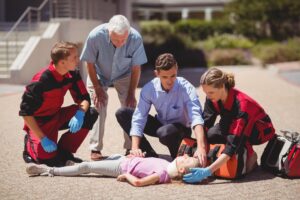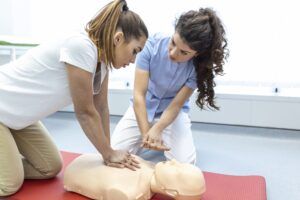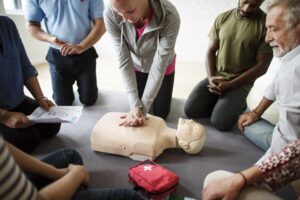Table of Contents
ToggleThe duties of an unarmed security guard may include securing a commercial premises and patrolling a property.
An unarmed security guard typically has a range of duties to perform, depending on the specific assignment and setting. Some of the typical duties of an unarmed security guard may include:
Security Patrol Duties can be done on foot or in a mobile security patrol car, these duties may include the following common procedures:
- Inspection and patrol of a regular premises
- Securing all exits to to a building
- Checking all doors and windows are closed and secure
- Monitoring the property entrance to ensure it has not been broken into
- Report of any suspicious activity in the area
- Physical check of security surveillance cameras, which may be remotely monitored
- Check with Security Control Room of activated alarms
Security Training for Patrol Duties
When training to be a security guard, the course covers units of competency for the duties of a Security Patrol Guard. These units include, CPPSEC2107 Patrol premises to monitor property and maintain security and CPPSEC2109 Monitor and control access and exit of persons and vehicles from premises.
Upon completion of the full security guard training course, you can then apply to the SLED for an 1A Unarmed Guard security licence.
A security guard’s duties are highly respected, as they work with the police and with the client to reduce the risk of crime.
Crowd Controller roles & responsibilities
Of course other duties of a security guard can include crowd control in hotels and large venues such as music festivals.
- Crowd Management: Maintaining order and ensuring the safety of individuals in crowded areas, such as events, concerts, or public gatherings.
- Access Control: Checking identification, tickets, or credentials to grant entry to authorized individuals and preventing unauthorized access.
- Surveillance: Monitoring the premises or designated areas using surveillance systems, CCTV cameras, or personal observation to detect and report any suspicious activities.
- Patrolling: Conducting regular patrols of the assigned area to deter potential security breaches, respond to incidents, and ensure a visible security presence.
- Conflict Resolution: Resolving conflicts or disputes among individuals peacefully and in accordance with established protocols, using verbal de-escalation techniques.
- Emergency Response: Acting swiftly and appropriately during emergency situations, such as medical incidents, fires, or evacuations, by following established protocols and assisting with crowd control.
- Customer Service: Providing assistance, guidance, and directions to attendees, ensuring a positive and helpful experience.
- Incident Reporting: Documenting any security incidents, accidents, or breaches in detail and reporting them to appropriate authorities or supervisors.
- Collaboration: Coordinating and communicating effectively with team members, event organizers, law enforcement, or emergency services to ensure a unified response to security situations.
- Adherence to Policies: Following and enforcing established security protocols, rules, and regulations to maintain a secure and orderly environment.
It’s important to note that specific duties may vary based on the organization, location, and nature of the event or premises being secured.
Licencing requirements for Crowd Controllers
The Security Licence 1C Crowd Controller licence can be applied for on completion of the security guard course CPP20218-Certificate II Security Operations.
In the security guard training course units are covered for the duties of Crowd Controller training involving having effective communication skills to maintaining security.
Enrol now with Multisec Training, a Security Guard Course can be completed in 10 days.
Security Guard Training Course
When you train with Multisec Training to be a security guard, we deliver Premium Security Guard Training. Our 10 day training course will set you on a path to become a Security Guard in NSW.





